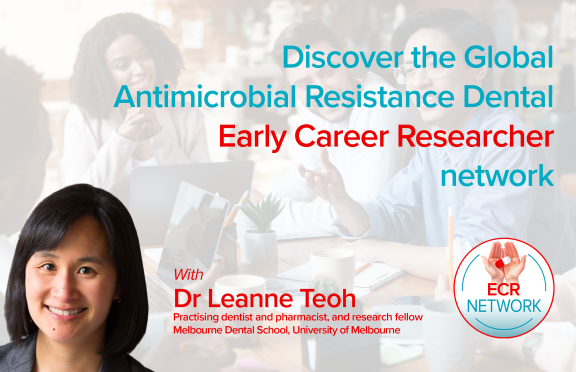Discover the Global Antimicrobial Resistance Dental network with Dr Leanne Teoh
Learn why and how the network brings together early career researchers to address antimicrobial resistance (AMR), one of the greatest threats faced by the world.

FDI sat down for an interview with Dr Leanne Teoh, a practicing dentist and pharmacist, and research fellow at Melbourne Dental School, University of Melbourne to discuss one of the greatest threats that the world is facing: antibiotic resistance (ABR). Dr Teoh’s research focuses on various aspects of medicine use in dentistry and dental prescribing practices. Through this interview she talks to us about the dental antimicrobial stewardship movement and discusses FDI’s Global Antimicrobial Resistance – Dental (GARD) Early career researcher (ECR) network.
Can you start by giving an overview of your daily work and practice?
My daily work can be quite different depending on the day of the week! I work as a dentist and pharmacist for half the week, although not at the same time, and the other half of the week is spent at the University of Melbourne, where I am a Lecturer of dental therapeutics and post-doctoral research fellow. My research focuses on drugs in dentistry, especially around developing tools to improve antibiotic prescribing and accessibility of drug information in dental practice.
What role does dentistry play in the development of antibiotic resistance?
Dentistry has an incredibly important role to play in ABR. Dental antibiotic prescribing accounts for a significant 10% of all prescribed antibiotics worldwide. However, up to 80% of those antibiotics are prescribed inappropriately. There are lots of opportunities for dentists and dental teams to play our part and join our healthcare colleagues to contribute to the global stewardship movement.
What are some of the challenges that dentists and dental teams face in tackling ABR?
I think the challenges can vary depending on where you are in the world, as there can be different factors that influence inappropriate prescribing. For example, guidelines around dental antibiotic prescribing differ worldwide, and they can influence the choice and reason for antibiotic prescription. Also, there are a lot of nonclinical factors that influence prescribing, such as limited clinical time, and patient expectations and requests. So there are many challenges, both clinical and nonclinical, that can influence inappropriate antibiotic prescribing in dentistry.
What is the purpose and goals of the Global Antimicrobial Resistance – Dental (GARD) Early career researcher (ECR) network?
The GARD ECR network is part of FDI World Dental Federation, and the purpose is to allow researchers interested in dental antibiotic resistance and stewardship to come together to pool our resources and collaborate. This enables us to explore this issue in more countries. In dentistry, most research is on other aspects – dental materials, endodontics, cariology and so on – so this is a relatively newly established area of research.
Who can join this network and how can they access it?
The definition of the ECR for this group is that one has to be within 10 years of their first peer-reviewed publication relating to dental antibiotic resistance or stewardship, or within 10 years of starting their postgraduate qualification relating to dental antibiotic research. It’s very easy to become part of this group – if you fit into this category and are interested - you can join the group through FDI’s website by completing the registration form.
What are some of the major benefits of this network, specifically for early career researchers?
The network is designed to foster collaborations to explore different aspects of dental antibiotic resistance and stewardship. By having people from different countries allows us to expand our research network and focus as well. ECRs will also have opportunities to present to an international audience - we have monthly journal clubs, where someone will present their research, and we also discuss new projects that we are working on together. Certainly, I think being able to network and meet researchers in this specific area from all around the world really helps grow connections, ideas, and research output.
How do you think this network can contribute to combatting the problem of antibiotic resistance, globally?
I think this network, which is the first dental network focused on antibiotic resistance and stewardship, has great potential to contribute to improving the issue of ABR. Already, members have previously been involved in raising awareness and producing various resources by FDI, such as the FDI White Paper on tackling antibiotic resistance, and the corresponding Massive Online Open Course. But I think the strength of the group lies in the dedication and diversity of the people - we have researchers from several different countries and from different areas of health, including dentistry, medicine, pharmacy, public health and global health. So the perspective and experiences of each member can be quite different. Getting to harness the potential in this rich pool of resources is a great opportunity for ECRs, and for us to contribute to tackling the global public health problem of antibiotic resistance.
Are you interested in joining FDI’s GARD ECR network? Join through our website and stay up-to-date about its activities through the LinkedIn group. Don’t miss this unique opportunity to connect with researchers from all over the world and help find solutions to tackle antimicrobial resistance in dentistry.
Learn more about the Antibiotic Resistance in Dentistry Project.
Editor’s note: this interview has been edited for length and clarity.
